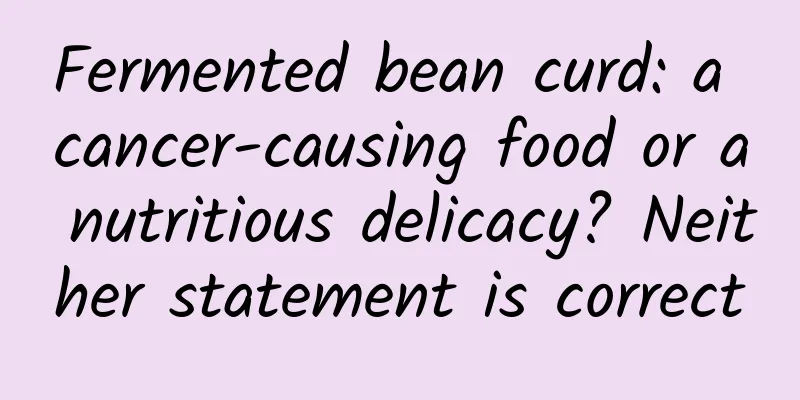Fermented bean curd: a cancer-causing food or a nutritious delicacy? Neither statement is correct

|
There is a condiment that is unique to China, and that is fermented bean curd. Fermented bean curd is a condiment unique to China, but for Chinese people, it is not just a condiment, but also a food that every household loves to eat with their meals. Using fermented bean curd as the main condiment, Chinese people can cook a variety of delicacies, such as fermented bean curd pork ribs, fermented bean curd chicken wings, stir-fried water spinach with fermented bean curd, etc. As a food, fermented bean curd can be eaten with porridge or rice, or it can be directly sandwiched between steamed buns. Taking a bite is much more satisfying than eating a hamburger. Fermented bean curd has a long history, and Chinese people have loved fermented bean curd for a long time, but as modern people pay more and more attention to food safety, they have two completely different views on fermented bean curd. Some people think that fermented bean curd is a typical carcinogenic food, while others believe that fermented bean curd is nutritious and good for health. So which statement is correct? On the surface, it seems to make sense to say that fermented bean curd can cause cancer, because fermented bean curd is essentially a fermented food, and during the corruption process, it will produce substances such as aflatoxin and nitrite, which are typical carcinogens. If these harmful substances are really produced during the production process of fermented bean curd, then fermented bean curd is definitely a carcinogenic food, but in fact, all of this is just speculation. The production of fermented bean curd is different from the spoilage process of general food. Mucor, Aspergillus, Penicillium and yeast are used to make fermented bean curd, with Mucor being the main ingredient. Whether it is Mucor as the main ingredient, or Aspergillus, Penicillium and yeast, they are all edible fungi. These edible fungi do not produce any toxins during the production process, and there is no experimental evidence to prove that these edible fungi are carcinogenic. As for the red coloring pigment used to color fermented bean curd, it is also harmless, because red coloring pigment is a natural pigment produced by Monascus purpurogenum, and has no toxic side effects on the human body, and there is also no evidence to prove that it is carcinogenic. Now that we have made it clear that fermented bean curd is not a carcinogenic food, is it a nutritious delicacy? Actually, it is not. From the perspective of nutritional ingredients, fermented bean curd is indeed rich in nutrition. It not only contains high-quality protein, but also isoflavones, oligosaccharides, vitamin B12 and other nutrients. Moreover, after fermentation, the isoflavones in fermented bean curd will be converted into free isoflavone aglycones. Compared with isoflavones, isoflavone aglycones are more easily absorbed by the human body, thus playing a role in preventing the occurrence of coronary heart disease. In addition, after being hydrolyzed by microbial enzymes, a large amount of low-molecular-weight polypeptide mixtures will be generated in fermented bean curd, and these polypeptide mixtures can greatly improve the digestibility of protein. Some studies have also shown that certain substances in fermented bean curd can inhibit the activity of acetylcholinesterase produced by the human body. It has now been confirmed that there is a certain correlation between acetylcholinesterase and the onset of Alzheimer's disease. It seems that fermented bean curd is not only nutritious, but also has many functions that are beneficial to the human body. In this case, why is fermented bean curd not considered a nutritious food? Because when defining a food, we should not only look at its nutritional content, but also the actual intake. If fermented bean curd is a vegetable or staple food, it is definitely a nutritious and health food with such rich nutritional content. However, fermented bean curd is only a seasoning or a side dish, and the actual intake is very limited. Although fermented bean curd itself is rich in nutrients, it is unrealistic to expect to achieve the effect of nutritional supplement by eating a small piece of it for breakfast every day. If you really eat a can of fermented bean curd a day, it will not only fail to supplement your nutrition, but also harm your health because you will be taking too much salt. Therefore, fermented bean curd is neither a nutritious delicacy nor a carcinogenic food. It is just an ordinary snack or seasoning. If you like it, you can eat it without worrying about it. If you don't like it, you don't have to force yourself to eat it. It is right to pay attention to food safety, but being overly cautious will only cause trouble. |
<<: Can loquat really relieve cough? The truth is...
Recommend
Why do nipples itch after breast care?
Nowadays, girls love beauty very much. For the sa...
What should I do if the newly renovated house is eye-catching? There are toxic substances in the newly renovated house
It is the peak season for home decoration recentl...
National Myopia Prevention and Control Education Month | How to prevent and control myopia in children? Beware of four blind spots!
For the sake of children's studies Many paren...
Are black tadpoles poisonous? What do tadpoles eat?
Tadpoles are the larvae of amphibians such as fro...
How much does it cost to have red labia
The surgical treatment of labia minora red markin...
Is it normal to have breast lumps during pregnancy?
Women's bodies are extremely sensitive during...
What causes abdominal pain during breastfeeding?
Lower abdominal pain can occur in all groups and ...
Itchy body in early pregnancy means boy
There will be many reactions at the body level in...
Popular Science | Learn about the important vitamin for the human body - Vitamin K
Vitamins are an essential topic when it comes to ...
If pregnant women eat bayberry, will the fetus become dark?
Bayberry wine is a common fruit in daily life. It...
How should I care after uterine prolapse surgery?
Uterine prolapse is a very common gynecological d...
How to solve the problem of frequent urination and urgency in women?
Urinary urgency refers to the need to urinate as ...
Drinking Isatis Root when you are sick? A man was poisoned and fell into a coma! Pay attention to these 5 points when taking it →
Recently, Mr. Zhang, 40, was sent to the hospital...
What are the benefits of drinking honey lemon water? Can I drink honey lemon water when I have internal heat?
Honey lemon water is rich in vitamin C, which has...









